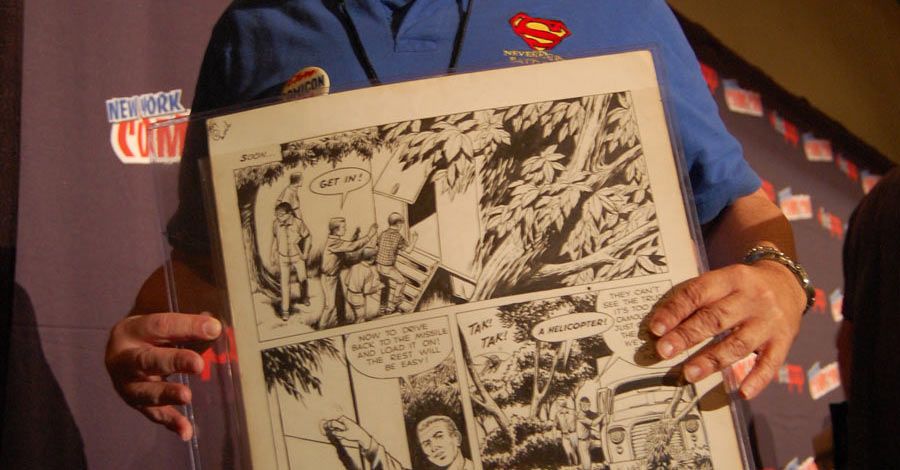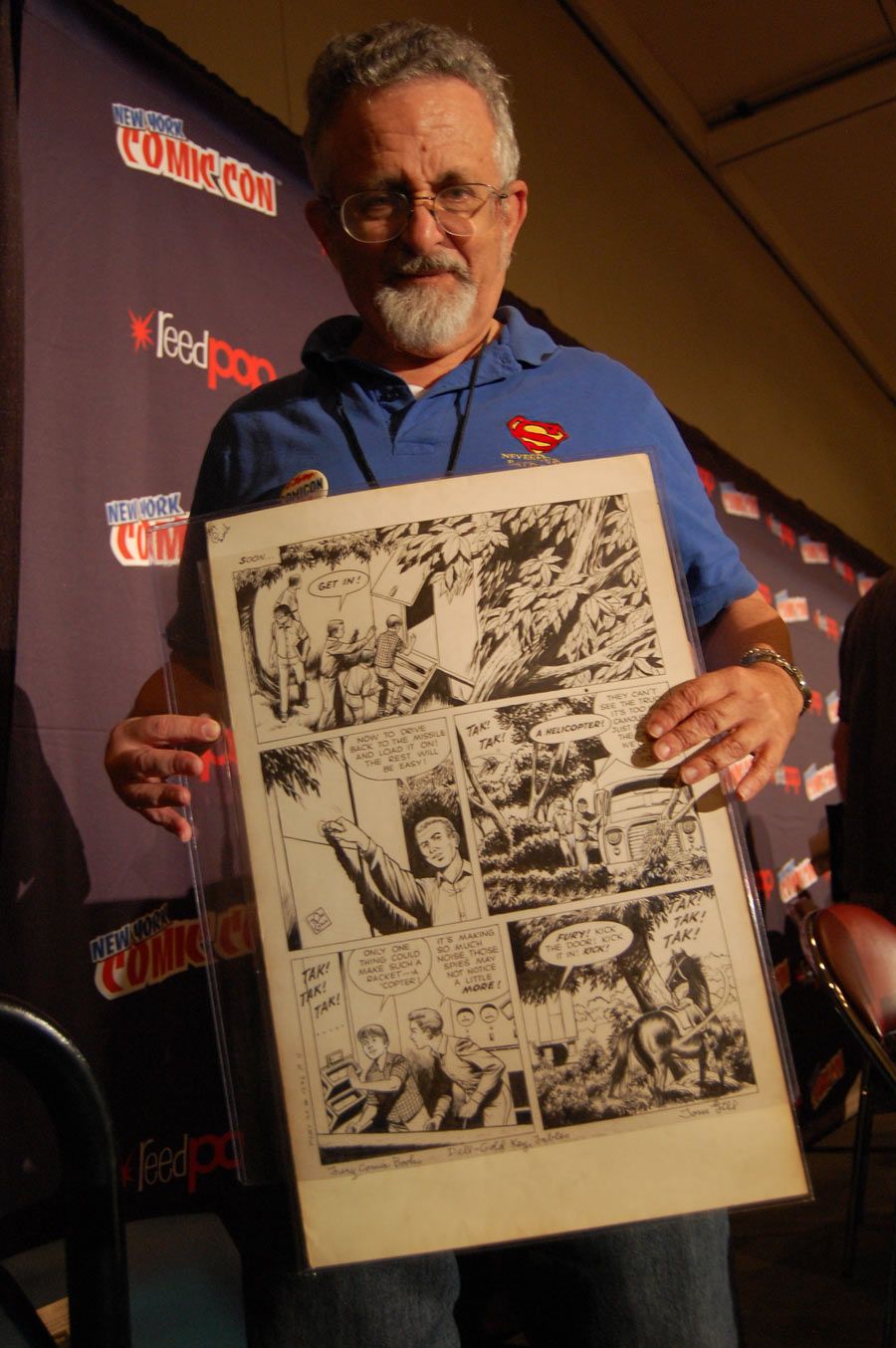The event that most comics historians agree was the first true comics convention occurred just over 50 years ago, on July 27, 1964, in New York City. In 2014, New York Comic Con celebrated that gathering with the "Survivors of the First Comic Con" panel. The original show's organizers sat in a massive room and reminisced about pulling together the very first comics convention, the summer when they were 16, little realizing what they had wrought.
An ad hoc affair, Bernie Bubnis, who was the lead organizer, admitted that he had to fire the first organizing committee and start all over again. If he hadn't done so, there might not have ever been a first comic con -- or a second one.
It wasn't a big event, but it held the seeds of much of what was to come. There were 43 attendees, and only of three of those were comics creators. It was Steve Ditko's first and only convention. Marvel and DC gave the organizers comics and original art to give to the attendees, and Stan Lee's secretary, Flo Steinberg, went to the con to see what it was like; she was one of three women in attendance. Among the five dealers were Phil Seuling, who would go on to reshape the comics industry, and his partner, Len Berman. Len Wein, later one of the creators of Swamp Thing and Wolverine, was a member of the organizing committee, although at one point he was thrown off. Nonetheless, everyone credits him with inventing the term "comic con." And the first person to buy a badge for the first comic con was George Martin, better known in later years as George R.R. Martin, the creator of "Game of Thrones."
In addition to Bubnis and Wein, the panel included two other members of the organizing committee, Ethan Roberts and Art Tripp, as well as attendee Rick Bierman, dealer Howard Rogofsky and Flo Steinberg herself, who still does proofreading for Marvel. Another member of the organizing committee, Ron Fradkin, was unable to attend, but he made a cassette tape with some comments for the panel.
Contrary to what Dr. Frederic Wertham would have predicted, none of the panelists ended up in a life of crime, and contrary to stereotype, most of them not only dated but managed to get married. What's more, Roberts, who worked for the Veterans Administration for 30 years, pointed out that all the organizers were Vietnam combat vets, and that Tripp holds the purple heart, the Bronze Star and the Silver Star.
Bubnis was the chairman of the organizing committee, almost by default. A friend of the organizers, he realized they weren't making any progress. "I went along with them on this one trip to Penn Station where all these comics were set up, and nothing was getting done," he said. "There was no question, there was never going to be a convention with this group at all."
"We were 16 years old!" Wien retorted.
"That's being young and not knowing you can't accomplish something," said Bubnis. "We had no idea we couldn't pull this thing off. We left there and we took a subway train to Sixth Avenue. We bought some comic books, and we left there thinking we were going to fire the original committee and start this thing all over again, and that's really what we did." The group put a deposit on a YMCA meeting room in Newark, New Jersey, because they used to go to meetings of the Eastern Science Fiction Association there. (Although no one on the panel mentioned it explicitly, the ESFA may have been the inspiration for the comic con, as it had been holding science fiction conventions for several years at that point.) "We were just so screwed up, it wasn't funny," said Bubnis. "If Ethan didn't rescue us, Ron and I would have been sitting in a room all by ourselves in Newark."
Tripp described his role as "chief cook and bottle washer." Before the convention, he went over to DC, where Carmine Infantino gave him a stack of original art, and to Marvel, where Stan Lee gave him some "Fantastic Four" and "Spider-Man" comics. He printed up the buttons for the con, but he forgot to get copyright clearance to put any comics characters on them. And on the day of the show, he sat on Tom Gill's car to make sure no one stole it.
"I was the firebrand," said Wien. Although the others kicked him off the committee, for reasons he claimed not to remember, his grandfather, an attorney, insisted he had the right to go to the show, and he did in fact attend. His chief contribution to posterity seems to be that he coined the term "comic con." "If only I had trademarked it!"
Fradkin was responsible for lining up the guests. Besides Ditko, who never went to another comics convention -- "We must have scared the hell out of him," Roberts said -- the professionals at the show were Tom Gill, the artist for the "The Lone Ranger" and other Dell comics, and writer Larry Ivie.
Roberts came late to the planning process, but his contribution was an important one: The venue. "It happened that my family was associated with a Jewish fraternal organization called The Workmen's Circle, the 1001 English-speaking branch," he said. "They had a small hall on Fourth Avenue and 12th Street." The convention took place on the second floor, where the air conditioning was no match for the heat of the day. "Phil Seuling and Len Berman brought in soda with ice; it melted all over the floor, and I got blamed."
Steinberg was sent to the convention by her boss, Stan Lee, who didn't really understand what it was but wanted someone to check it out. "Stan was always very busy -- he had to write all those scripts, do all that work -- he did everything," she said. "So he said, 'Well, do you want to go?' And I said, 'Yeah, I guess, OK, a few hours. Union Square is nice.' So I showed up. Of course in those days, you had on your little dress and pearls -- different, different -- and it was a nice bunch of people. It was very hot, and everybody was sort of sweating."
"You were glowing," Roberts interjected.
"It was a very pleasant few hours, chit chatting and this and that, and that was it," Steinberg said. "I'm sorry I don't have more detail."
Bierman did remember, in detail, that two hours before the con he and some friends paid a visit to DC's offices at 575 Lexington Avenue. "We met with Julie Schwartz and the entire bullpen, every editor," he said. "We met with artists, we were there for two hours, and then we left to go to the con. Julie had no interest in coming to the convention. Neither did Bob Kane. They didn't even understand what this concept was. They thought it was a bunch of kids trading comic books."
Although he was one of the dealers at the show, Rogofsky, who was still a teenager at the time, didn't bring any comics to sell; he was looking to buy some comics from Malcolm Willits, who had come out to the show from California. "When he quoted me a price, I said his prices were too high and he hated my guts for the next 50 years," Rogofsky said.
"I have to mention that when I talked to Malcolm Willits, he doesn't hate Howard's guts," said Roberts. "He's old, he probably forgot."
Most of the panelists still collect comics. Tripp reminisced about getting care packages with Kool-Aid, gum, and comics from his father when he was in Vietnam; they would get passed from unit to unit, with each one signing them, and eventually come back to him. When his daughter was born, a few years later, he sold his copies of "Wonder Woman" #1 and "Sensation" #1 to pay the medical bills. "My daughter is my Wonder Woman," he said, to applause from the crowd.
"I used to have a huge collection of underground comics from the '70s and '80s, and I just got rid of that," she said. Ironically, she never collected Marvel comics, nor did it ever occur to her to hold on to some of the original art that was regularly thrown out to make space in the Marvel offices.
Bubnis said he is currently selling off his collection to benefit the Damon Runyon Cancer Fund, but every time he takes some out to sell, he admits, he ends up sitting down and reading a few. "I started reading comic books because I had to hide from my parents, who were a little tough to live with," he said. "It was great to close the door and travel to the fortress of solitude and another dimension.
"Back in those days, we didn't make any money on this thing at all," Bubnis concluded. "It was a love affair that we all had with comics."


